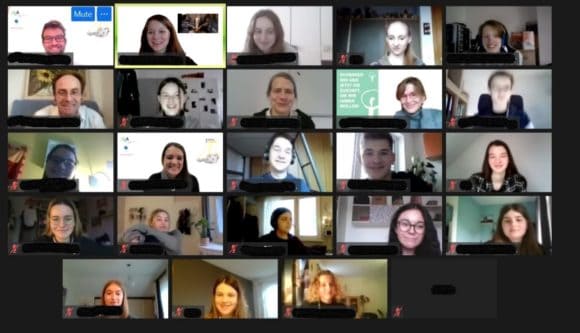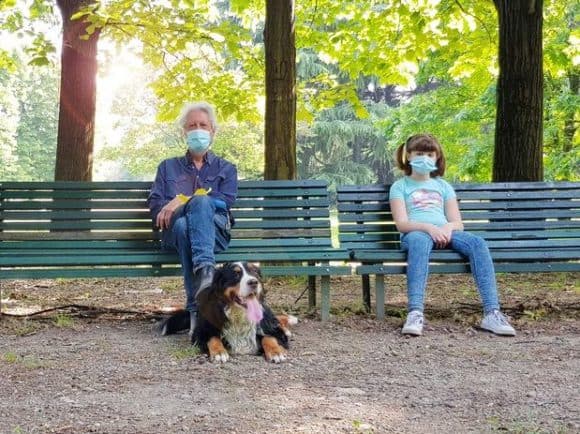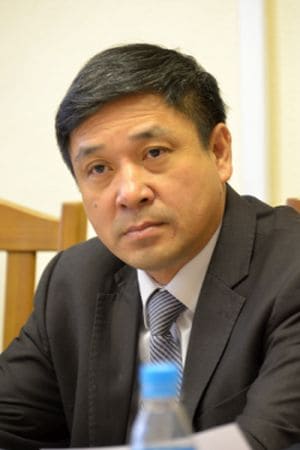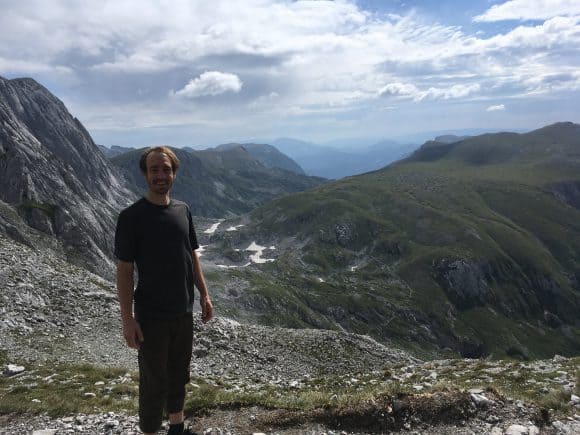Oct 6, 2021 | Food, Sustainable Development, Wellbeing
By Frank Sperling, Senior Project Manager in the Integrated Biosphere Futures Research Group of the IIASA Biodiversity and Natural Resources Program
Frank Sperling shares his reflections on issues around sustainable and transformational food production in the context of the UN Food Systems Summit.

© Solarseven | Dreamstime.com
Bringing together stakeholders from around the globe, the United Nations Food Systems Summit (UNFSS) calls attention to the opportunities, challenges, and promises that the transformation of our food systems can hold to advance sustainable development.
This transformation needs to happen, while the ongoing Covid-19 pandemic reminds us of the manifold vulnerabilities embedded in our food systems, the inter-dependence of our societies, and the entanglement of human and natural systems. The increases in weather and climate extremes that can clearly be attributed to climate change, ongoing biodiversity loss, environmental degradation, and pollution further illustrate that food systems need to manage a broad range of compounding risks and pressures that play out over different spatial and temporal scales. Advancing and securing gains towards the Sustainable Development Goals (SDGs) will not only require meeting multiple economic, social, and environmental objectives, but also demand pathways that ensure a safe navigation through a treacherous and shifting risk landscape. But how do we build resilience into the food system while transforming it at the same time?
Great strides have been made in technologies and practices that can help food systems manage existing and emerging risks. For example, on the production side, timely access to seasonal forecasts and early warning information coupled with extension services can help farmers to make the right decisions for planting and to anticipate, adapt, and cope with possible shocks. Precision agriculture, which harnesses advances in technology to ensure optimal health and productivity of crops and soils, can reduce the need for inputs. Diversification of livestock and agricultural traits can help farmers to reduce production risks in marginal environmental conditions.
Minimizing the spillover risk of zoonotic diseases, mitigating, and adapting to climatic and environmental changes place additional demands on food systems, but also offer new opportunities. Living sustainably requires comprehensively managing land use, enabling for food production, but maintaining and recovering critical ecosystem goods and services, such as carbon and biodiversity. It requires advancing nature-based solutions, where nature is seen as an ally and not an adversary in delivering on development objectives. Strengthening natural capital accounting and incentivizing environmental stewardship by rewarding actors in the food system for efficient and sustainable management of natural resources, and appropriately informing consumer choices will be important ingredients in reducing the environmental impact as well as environmental vulnerabilities of food systems.
The transformation of the food system is an ongoing process. It is therefore important to understand the impact of different changes across the system. Shifts to healthier diets can have important co-benefits in reducing pressure on the environment and natural resources. Such transformation implies, however, that shifts in demand are also matched by shifts in supply, reflecting appropriate adjustments of agricultural production. To accommodate such system shifts and facilitate system transitions over time, the social resilience and adaptive capacity of society must be addressed accordingly.
Food systems operate at different scales, ranging from local to global. Consequently, the role of trade in ensuring food security and human welfare across a range of contexts is critical. Several countries are already dependent on food imports. Trade can help the food security of regions where agricultural activities become less viable with progressive climate change. At the same time, the changing exposure to socioeconomic and environmental risks arising from the increasing inter-connectivity of societies and economies also need to be addressed, as illustrated by the current pandemic. The evolution of food systems has been largely shaped by a drive for efficiency. We must now consider carefully where efficiency needs to be (counter)balanced with an effort to promote greater diversity, and where we must build in greater redundancy to help manage the variety of risks facing food systems.
Forward-looking approaches aimed at transforming food systems towards greater resilience and sustainability will require a suite of measures within, as well as outside food systems. Such measures entail helping livelihoods and sectors to reduce their vulnerabilities and risk exposure, while also enabling the agility of food systems to manage future risks, avoiding lock-in of structures, which would become mal-adaptive over time. Achieving such transformation will depend on increased collaboration and trust building across sectors, enabling innovation in technologies and practice, strengthening of training and capacity development, and on the improvement of safety nets for reducing vulnerabilities to shocks and managing the social transition. Above and beyond, it requires re-calibrating the connection of food systems with other sectors and systems, such as health, environment, energy, and infrastructure.
The UNFSS in conjunction with the upcoming UN Climate Change Conference in Glasgow (UNFCCC COP26), and the UN Conference on Biological Diversity in Kunming (CBD COP15), are a formidable call to action for political leaders, decision makers in the public and private sectors, scientists, development practitioners, civil society, and to society at large, to come together and jointly imagine and build resilient and sustainable food systems that place people and nature at the center before it is too late.
This blog post was first published on the website of the International Science Council. Read the original article here.
Note: This article gives the views of the author, and not the position of the Nexus blog, nor of the International Institute for Applied Systems Analysis.
Feb 18, 2021 | Austria, Climate, Climate Change, Communication, Education, Health
By Thomas Schinko, Acting Research Group Leader, Equity and Justice Research Group
Thomas Schinko introduces an innovative and transdisciplinary peer-to-peer training program.
What do we want – climate justice! When do we want it – now! The recent emergence of youth-led, social climate movements like #FridaysForFuture (#FFF), the Sunrise Movement, and Extinction Rebellion has reemphasized that at the heart of many – if not all – grand global challenges of our time, lie aspects of social and environmental justice. With a novel peer-to-peer education format, embedded in a transdisciplinary research project, the Austrian climate change research community responds to the call that unites these otherwise diverse movements: “Listen to the Science!”
The climate crisis raises several issues of justice, which include (but are not limited to) the following dimensions: First, intragenerational climate justice addresses the fair distribution of costs and benefits associated with climate change mitigation and adaptation, as well as the rectification of damage caused by residual climate change impacts between present generations. Second, intergenerational justice focuses on the distribution of benefits and costs from climate change between present and future generations. Third, procedural justice asks for fair processes, namely that institutions allow all interested and affected actors to advance their claims while co-creating a low-carbon future. Movements like #FFF maneuver at the intersection of those three forms of climate justice when calling on policy- and decision makers to urgently take climate action, since “there is no planet B”.
Along with the emergence of these youth-led social climate movements came an increasing demand for the expertise of scientists working in the fields of climate change and sustainability research. To support #FFF’s claims with the best available scientific evidence, a group of German, Austrian, and Swiss scientists came together in early 2019 as Scientists for Future. Since then, requests from students, teachers, and policy and decision makers for researchers to engage with the younger generation have soared, also in Austria. Individual researchers like me have not been able to respond to all these requests at the extent we would have liked to.
In this situation of high demand for scientific support, the Climate Change Center Austria (CCCA) and The Federal Ministry of Education, Science and Research (BMBWF) have put their heads together and established a transdisciplinary research project – makingAchange. By engaging early on with our potential end users – Austrian school students – a truly transdisciplinary team of researchers as well as practitioners in youth participation and education (the association “Welt der Kinder”) has co-developed this novel peer-to-peer curriculum. The training program, which runs over a full school year, sets out to provide the students not only with solid scientific facts but also with soft skills that are needed for passing on this knowledge and for building up their own climate initiatives in their schools and municipalities. One of the key aims is to provide solid scientific support while not overburdening the younger generation who often tend to put too high demands on themselves.
Establishing scientific facts about climate change and offering scientific projections of future change on its own does not drive political and societal change. Truly inter- and transdisciplinary research is needed to support the complex transformation towards a sustainable society and the integration of novel, bottom-up civil society initiatives with top-down policy- and decision making. Engaging multiple actors with their alternative problem frames and aspirations for sustainable futures is now recognized as essential for effective governance processes, and ultimately for robust policy implementation.
Also, in the context of makingAchange it is not sufficient to communicate science to students in order to generate real-world impact in terms of leading our societies onto low-carbon development pathways. What is additionally needed, is to provide them with complementary personal and social skills for enhancing their perceived self-efficacy and response efficacy, which is crucial for eventually translating their knowledge into real climate action in their respective spheres of influence.
Recent insights from a medical health assessment of the COVID-19 related lockdowns on childhood mental health in the UK have shown that we are engaging in an already highly fragile environment. In addition, a recent representative study for Austria has shown that the pandemic is becoming a psychological burden. The study authors are particularly concerned about young people; more than half of young Austrians are already showing symptoms of depression. Hence, we must engage very carefully with the makingAchange students when discussing the drivers and potential impacts of the climate crises. Particularly since some of them are quite well informed about research, which has shown (by using a statistical approach) that our chances of achieving the 1.5 to 2°C target stipulated in the Paris Agreement are now probably lower than 5%. Another example of such alarming research insights comes in the form of a 2020 report by the World Meteorological Organization, which warns that there is a 24% chance that global average temperatures could already surpass the 1.5°C mark in the next five years.

Zoom group picture taken at the end of the second online makingAchange workshop for Austrian school students. Copyright: makingAchange
The first makingAchange activities and workshops have now taken place – due to the COVID-19 regulations in an online format, which added further complexity to this transdisciplinary research project. Nevertheless, we were able to discuss some of the hot topics that the young people were curious about, such as the natural science foundations of the climate crisis, climate justice, or a healthy and sustainable diet. At the same time, we provided our students with skills to further transmit this knowledge and to take climate action in their everyday live – such as a climate friendly Christmas celebration in 2020. The school student’s lively engagement in these sessions as well as the overall positive (anonymous) feedback has proven that we are on the right track.
The role of science is changing fast from “advisor” to “partner” in civil society, policymaking, and decision making. By doing so, scientists can play an important, active role in implementing the desperately needed social-ecological transformation of our society without becoming policy prescriptive. With the makingAchange project, we are actively engaging in this transformational process – currently only in Austria but with high ambitions to scale-out this novel peer-to-peer format to other geographical and cultural contexts.
Note: This article gives the views of the author, and not the position of the Nexus blog, nor of the International Institute for Applied Systems Analysis.
Jun 3, 2020 | COVID19, Health, Science and Policy, Women in Science
By Nicole Arbour, external relations manager in the IIASA Communications and External Relations department
As Canadian expats in Austria, one of the things that has particularly struck my family and I is the orderliness with which the country is dealing with the pandemic. As quarantine policies were put into place, we saw panic toilet paper hoarding in other countries, but here in Austria people were (amazingly) compliant and seemed to obey instructions and timelines provided by the authorities. We never worried about our basic needs. Grocery stores were always well stocked, public transit was always there and on time – and masks were readily available when required as physical barrier to protect others.

© Luca Santilli | Dreamstime.com
Expert opinions, governments, and publics are making it clear that there is no one-size-fits-all solution to this pandemic. What works in Austria might not be what worked for South Korea; and likely not the same as what works in other parts of Europe. Consider the Canadian landscape. There is huge variation in sociopolitical and cultural dynamics between and within provinces and territories. What works for some parts of Canada (virtual home schooling, grocery shopping) is impossible for others (Canada’s North). Cultural norms (multigenerational living, child/elder care) vary across the vast landscape. The “At Home on the Land” initiative – aimed at the particular needs of Indigenous communities is an example of a culturally-grounded way to address the pandemic. Finding solutions isn’t always as intuitive as we might like.
Humans tend to look for the easiest way out – we want simple solutions to complex problems. We don’t seem to want to think about the problems, we want them magically disappear. And thinking “outside of the box” isn’t always appreciated. Hand washing, clean water and the advent of antibiotics have made enormous leaps in our ability to tackle public health outbreaks – significant results. Where the bubonic plague is estimated to have killed 30%-60% of Europe’s population in the Middle Ages, modern outbreaks are now quickly identified and contained (were you even aware of the 2017 outbreak in Madagascar?). Understanding transmission routes has significantly impacted public health outcomes. The identification of tainted water as a vector for cholera transmission by John Snow led to the advent of modern epidemiology. But, as we find solutions to larger challenges, those that remain are more complex with increasing numbers of variables making solutions harder to come by.
There is some global agreement: lots of testing, quick results/containment, use of masks/physical barriers for community protection, social distancing, data collection. However, certain measures work better in some jurisdictions than others. What policies and practices are working and why are they working in these contexts? What is applicable in different contexts?
Our current global situation, has reminded me of a presentation I saw on the 2014 Ebola outbreak (Professor Melissa Leach, IDS), and how important it is to remember the human factor in crises. She discussed how the key elements that made the Ebola pandemic so persistent – despite the best efforts of global public health engagement – was a/the failure to understand how historic context, trust, cultural dynamics played into the spread of the virus. Those providing interventions did not appreciate how historic context (i.e. post-colonialism, slavery, medical testing scandals) and mistrust in the intentions of Western interventions factored into the willingness of the local population to accept the solutions provided. Awareness of social structures, influencers and leaders, and co-creation were also important to developing solutions that would be adopted by affected communities.
Evidence is more than the numbers of tests, infections and deaths. It is understanding the social context of communities, society writ large, and how they interact within and between. It’s about understanding historical context and how it feeds into local culture, social interactions and trust relationships. It’s about community dynamics, power struggles and the struggle for some to meet basic survival needs. It’s about timing of decision-making, political landscapes and different ways of leading. As with many of our global challenges, it’s a complex and multifaceted systems problem – in which the human factor is a huge driver.
As we strive for solutions to this global crisis – bring on innovation, research and science funding. We will need these – but please, also bring along those who study the complexity that is humanity: epidemiologists, anthropologists, economists, ethicists, political scientists, sociologists, futurists, etc. In an era where evidence is being questioned, fake news is rampant and anti-science sentiments are strong, it is crucial that we remember that one piece to engaging with this and the world’s other wicked problems is our relationships with our communities – the ones we are trying to protect. Public trust, built on understanding of the importance of human dynamics is key to broad acceptance and uptake. Solutions need to be palatable to society, or they won’t be adopted.
As we focus on the virus, let’s not forget the humans.
Note: This article gives the views of the author, and not the position of the Nexus blog, nor of the International Institute for Applied Systems Analysis. Link to original post: https://sciencepolicy.ca/news/save-covid19-lets-not-forget-humans
May 29, 2019 | Science and Policy, Vietnam
Tran Thi Vo-Quyen, IIASA guest research scholar from the Vietnam Academy of Science and Technology (VAST), talks to Professor Dr. Ninh Khac Ban, Director General of the International Cooperation Department at VAST and IIASA council member for Vietnam, about achievements and challenges that Vietnam has faced in the last 5 years, and how IIASA research will help Vietnam and VAST in the future.

Professor Dr. Ninh Khac Ban, Director General of the International Cooperation Department at VAST and IIASA council member for Vietnam
What have been the highlights of Vietnam-IIASA membership until now?
In 2017, IIASA and VAST researchers started working on a joint project to support air pollution management in the Hanoi region which ultimately led to the successful development of the IIASA Greenhouse Gas – Air Pollution Interactions and Synergies (GAINS) model for the Hanoi region. The success of the project will contribute to a system for forecasting the changing trend of air pollution and will help local policy makers develop cost effective policy and management plans for improving air quality, in particular, in Hanoi and more widely in Vietnam.
IIASA capacity building programs have also been successful for Vietnam, with a participant of the 2017 Young Scientists Summer Program (YSSP) becoming a key coordinator of the GAINS project. VAST has also benefited from two members of its International Cooperation Department visiting the IIASA External Relations Department for a period of 3 months in 2018 and 2019, to learn about how IIASA deals with its National Member Organizations (NMOs) and to assist IIASA in developing its activities with Vietnam.
What do you think will be the key scientific challenges to face Vietnam in the next few years? And how do you envision IIASA helping Vietnam to tackle these?
In the global context Vietnam is facing many challenges relating to climate change, energy issues and environmental pollution, which will continue in the coming years. IIASA can help key members of Vietnam’s scientific community to build specific scenarios, access in-depth knowledge and obtain global data that will help them advise Vietnamese government officials on how best they can overcome the negative impact of these issues.
As Director General of the International Cooperation Department, can you explain your role in VAST and as representative to IIASA in a little more detail?
In leading the International Cooperation Department at VAST, I coordinate all collaborative science and technology activities between VAST and more than 50 international partner institutions that collaborate with VAST.
As the IIASA council representative for Vietnam, I participate in the biannual meeting for the IIASA council, I was also a member of the recent task force developed to implement the recommendations of a recent independent review of the institute. I was involved in consulting on the future strategies, organizational structure, NMO value proposition and need to improve the management system of IIASA.
In Vietnam, I advised on the establishment of a Vietnam network for joining IIASA and I implement IIASA-Vietnam activities, coordinating with other IIASA NMOs to ensure Vietnam is well represented in their countries.
You mentioned the development of the Vietnam-IIASA GAINS Model. Can you explain why this was so important to Vietnam and how it is helping to improve air quality and shape Vietnamese policy around air pollution?
Air pollution levels in Vietnam in the last years has had an adverse effect on public health and has caused significant environmental degradation, including greenhouse gas (GHG) emissions, undermining the potential for sustainable socioeconomic development of the country and impacting the poor. It was important for Vietnam to use IIASA researchers’ expertise and models to help them improve the current situation, and to help Vietnam in developing the scientific infrastructure for a long-lasting science-policy interface for air quality management.
The project is helping Vietnamese researchers in a number of ways, including helping us to develop a multi-disciplinary research community in Vietnam on integrated air quality management, and in providing local decision makers with the capacity to develop cost-effective management plans for the Hanoi metropolitan area and surrounding regions and, in the longer-term, the whole of Vietnam.
About VAST and Ninh Khac Ban
VAST was established in 1975 by the Vietnamese government to carry out basic research in natural sciences and to provide objective grounds for science and technology management, for shaping policies, strategies and plans for socio-economic development in Vietnam. Ninh Khac Ban obtained his PhD in Biology from VAST’s Institute of Ecology and Biological Resources in 2001. He has managed several large research projects as a principal advisor, including several multinational joint research projects. His successful academic career has led to the publication of more than 34 international articles with a high ranking, and more than 60 national articles, and 2 registered patents. He has supervised 5 master’s and 9 PhD level students successfully to graduation and has contributed to pedagogical texts for postgraduate training in his field of expertise.
Notes:
More information on IIASA and Vietnam collaborations. This article gives the views of the authors, and not the position of the Nexus blog, nor of the International Institute for Applied Systems Analysis.
Mar 29, 2019 | USA, Young Scientists
By Matt Cooper, PhD student at the Department of Geographical Sciences, University of Maryland, and 2018 winner of the IIASA Peccei Award
I never pictured myself working in Europe. I have always been an eager traveler, and I spent many years living, working and doing fieldwork in Africa and Asia before starting my PhD. I was interested in topics like international development, environmental conservation, public health, and smallholder agriculture. These interests led me to my MA research in Mali, working for an NGO in Nairobi, and to helping found a National Park in the Philippines. But Europe seemed like a remote possibility. That was at least until fall 2017, when I was looking for opportunities to get abroad and gain some research experience for the following summer. I was worried that I wouldn’t find many opportunities, because my PhD research was different from what I had previously done. Rather than interviewing farmers or measuring trees in the field myself, I was running global models using data from satellites and other projects. Since most funding for PhD students is for fieldwork, I wasn’t sure what kind of opportunities I would find. However, luckily, I heard about an interesting opportunity called the Young Scientists Summer Program (YSSP) at IIASA, and I decided to apply.
Participating in the YSSP turned out to be a great experience, both personally and professionally. Vienna is a wonderful city to live in, and I quickly made friends with my fellow YSSPers. Every weekend was filled with trips to the Alps or to nearby countries, and IIASA offers all sorts of activities during the week, from cultural festivals to triathlons. I also received very helpful advice and research instruction from my supervisors at IIASA, who brought a wealth of experience to my research topic. It felt very much as if I had found my kind of people among the international PhD students and academics at IIASA. Freed from the distractions of teaching, I was also able to focus 100% on my research and I conducted the largest-ever analysis of drought and child malnutrition.

© Matt Cooper
Now, I am very grateful to have another summer at IIASA coming up, thanks to the Peccei Award. I will again focus on the impact climate shocks like drought have on child health. however, I will build on last year’s research by looking at future scenarios of climate change and economic development. Will greater prosperity offset the impacts of severe droughts and flooding on children in developing countries? Or does climate change pose a hazard that will offset the global health gains of the past few decades? These are the questions that I hope to answer during the coming summer, where my research will benefit from many of the future scenarios already developed at IIASA.
I can’t think of a better research institute to conduct this kind of systemic, global research than IIASA, and I can’t picture a more enjoyable place to live for a summer than Vienna.
Note: This article gives the views of the author, and not the position of the Nexus blog, nor of the International Institute for Applied Systems Analysis.






You must be logged in to post a comment.